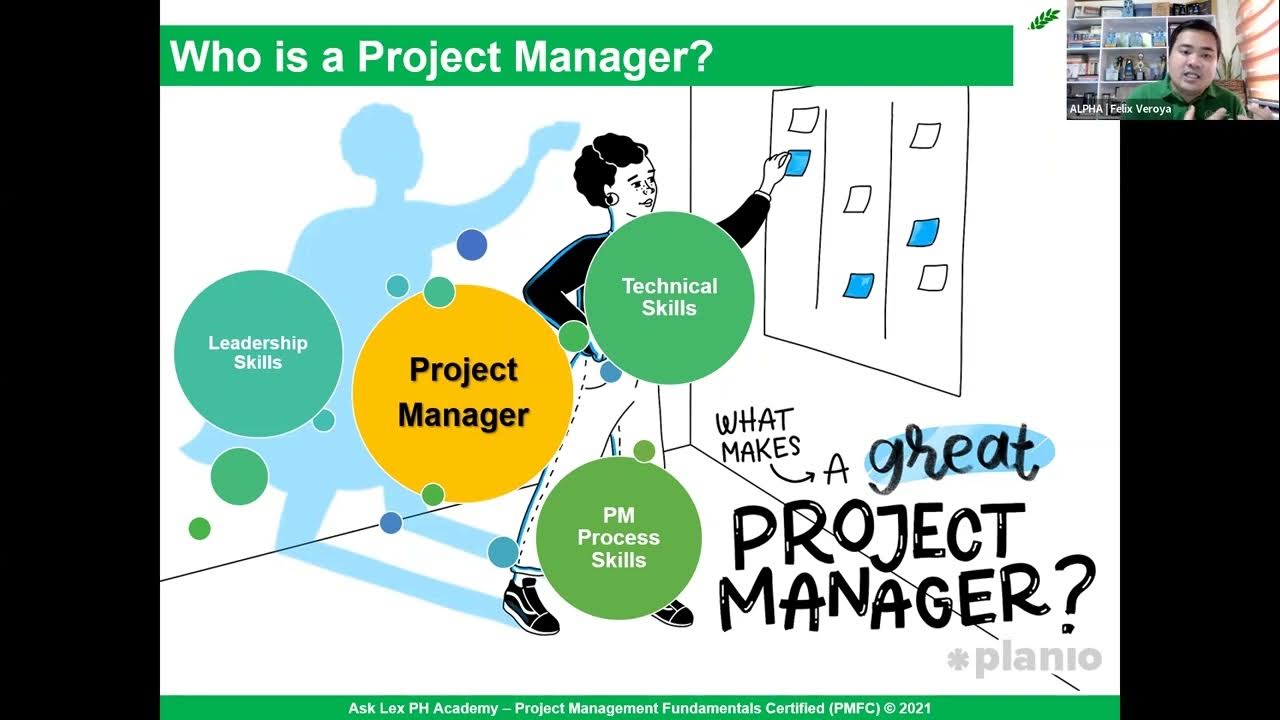Project Integration Management Overview
Summary
TLDRThis video provides an overview of Project Integration Management, emphasizing its critical role in project success. It outlines key processes, including developing the project charter, managing the project plan, and controlling project work. The speaker highlights the importance of aligning project deliverables with stakeholder expectations and adapting processes to meet project objectives. Emerging trends such as automated tools, hybrid methodologies, and the project manager's expanding responsibilities are discussed. The session underscores the necessity of effective knowledge management and governance in project management, preparing viewers for both PMP and CAPM exams.
Takeaways
- 😀 Project integration management is the first knowledge area in the Project Management Body of Knowledge (PMBOK).
- 📋 Key processes in project integration management include developing the project charter, project management plan, directing and managing project work, and closing the project.
- 🔄 Integrated change control is essential for making necessary adjustments to the project scope, cost, or schedule.
- 📅 The project management plan combines various subsidiary plans including scope, schedule, costs, quality, and risk management.
- 🧩 Project managers must balance competing demands from stakeholders and tailor processes to meet project objectives.
- 📊 Monitoring and controlling project work ensures that the project remains on track regarding time and costs.
- 🛠️ Emerging trends in project management include the use of automated tools and visual management tools like Kanban boards.
- 🌱 The role of project managers is expanding to include responsibilities like feasibility studies and the creation of business cases.
- 🌐 Hybrid methodologies, combining aspects of waterfall and agile approaches, are increasingly common in project management.
- 📖 Lessons learned from previous projects should be captured and applied to improve future project management practices.
Q & A
What is the primary focus of Project Integration Management?
-The primary focus of Project Integration Management is to ensure that all aspects of a project are effectively coordinated, including defining, combining, and coordinating project management activities across all knowledge areas.
What are the key processes involved in Project Integration Management?
-The key processes include developing the project charter, developing the project management plan, directing and managing project work, managing project knowledge, monitoring and controlling project work, and closing the project or project phase.
Why is the development of a project charter important?
-The development of a project charter is important because it initiates the project and secures agreement from stakeholders, outlining the project's objectives and authority.
What does a project management plan typically include?
-A project management plan typically includes components such as the project's scope, schedule, costs, quality requirements, risk management strategies, and other subsidiary plans.
How does a project manager ensure that a project stays on track?
-A project manager ensures that a project stays on track by monitoring and controlling project work, measuring progress against the project management plan, and performing integrated change control when necessary.
What role does knowledge management play in Project Integration Management?
-Knowledge management in Project Integration Management involves collecting, documenting, and sharing project-related information to enhance decision-making and improve future project outcomes.
What are some emerging trends in Project Integration Management?
-Emerging trends include the use of automated tools for data collection, visual management tools to track progress, expanding project managers' responsibilities, and the adoption of hybrid methodologies that combine various approaches.
How do hybrid methodologies impact project management?
-Hybrid methodologies impact project management by allowing the integration of traditional and modern approaches, providing greater flexibility and adaptability to meet project needs.
What factors should project managers consider when tailoring their approach?
-Project managers should consider the project lifecycle, management approach (autocratic or servant leadership), governance structures, and the lessons learned from previous projects when tailoring their approach.
Why is formal closure important in project management?
-Formal closure is important in project management to ensure that all project activities are completed satisfactorily, deliverables meet quality standards, and lessons learned are documented for future projects.
Outlines

Esta sección está disponible solo para usuarios con suscripción. Por favor, mejora tu plan para acceder a esta parte.
Mejorar ahoraMindmap

Esta sección está disponible solo para usuarios con suscripción. Por favor, mejora tu plan para acceder a esta parte.
Mejorar ahoraKeywords

Esta sección está disponible solo para usuarios con suscripción. Por favor, mejora tu plan para acceder a esta parte.
Mejorar ahoraHighlights

Esta sección está disponible solo para usuarios con suscripción. Por favor, mejora tu plan para acceder a esta parte.
Mejorar ahoraTranscripts

Esta sección está disponible solo para usuarios con suscripción. Por favor, mejora tu plan para acceder a esta parte.
Mejorar ahoraVer Más Videos Relacionados

#2B.6 - Integrasi pada Proyek Management - Part 6

Project Manager Roles And Responsibilities | What Do Project Managers Do | PMP® Training | Edureka

Who is a project manager_rev1

Lecture 15 : Coordination through Integration Management

Systems Analysis & Design - Ch 1 - Project Initation

PENGANTAR MANAJEMEN PROYEK SISTEM INFORMASI | Pertemuan 2
5.0 / 5 (0 votes)
